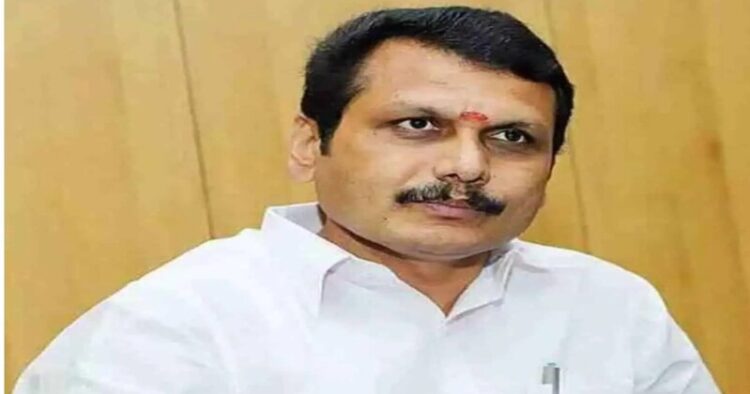V Senthil Balaji, the Tamil Nadu Minister without a portfolio and currently in judicial custody in connection with a money laundering case, has tendered his resignation from the State cabinet. Chief Minister MK Stalin promptly accepted the resignation, which has also been communicated to Raj Bhavan.
Senthil Balaji, known as one of the most influential ministers in the DMK government, was arrested by the Enforcement Directorate (ED) on June 14 last year. He faces allegations related to a cash-for-jobs scam during his tenure as the transport minister in the previous AIADMK regime. Despite being in prison for over 230 days, Balaji had been retained as a minister without portfolio by the DMK government, drawing criticism from the opposition.
Justice Anand Venkatesh referred to the earlier comments made by the first bench of the Madras High Court, led by the Chief Justice, in a quo warranto writ against Balaji. The Chief Justice had expressed reservations about Balaji’s extended tenure in public office amid criminal charges. The judge pointed out that even a last-grade state employee is deemed suspended if incarcerated for more than 48 hours in a criminal case, emphasising the disparity in the treatment of a minister.
Governor RN Ravi had dismissed Balaji from the Council of Ministers on June 29 last year, citing ongoing criminal cases, but the Raj Bhavan issued a second notice on the same day, putting the order on hold. Earlier, on May 31, 2023, the governor had written to the chief minister, advising the removal of Balaji from the cabinet in accordance with the Supreme Court’s directive to continue the investigation into the charges. However, the Tamil Nadu government, through a Government Order (G.O.), decided to reallocate Balaji’s portfolios and allowed him to continue as a minister without a portfolio.
blob:https://web.whatsapp.com/2eff49a1-06ab-487a-b4f4-243316d1cef7
The resignation comes after the Supreme Court concurred with the Madras High Court’s decision in January, refusing to issue a directive for Balaji’s removal as a minister. Despite the legal challenges, Chief Minister MK Stalin had retained Balaji in the cabinet. However, with the bail plea coming up for hearing on February 14, Balaji decided to step down.
In a letter sent to Chief Minister Stalin, Senthil Balaji expressed his decision to resign, which was subsequently forwarded to Raj Bhavan with the CM’s recommendation. The governor, in all likelihood, is expected to accept Balaji’s resignation. The communication from the governor acknowledged the acceptance of Senthil Balaji’s resignation, signaling a significant development in the political landscape of Tamil Nadu.
The resignation follows months of legal turmoil, with concerns raised by the judiciary and opposition regarding Balaji’s continued role as a minister. The Principal Sessions and Special Court’s dismissal of his bail application on grounds of potential interference with witnesses added further pressure.
Senthil Balaji, a key figure in the DMK government’s cabinet, was arrested by the ED on June 14 last year in connection with an alleged cash-for-jobs scam. His brother has been evading ED inquiries, adding to the complications in the legal proceedings. Balaji had sought bail on various grounds, including health conditions, but these attempts were repeatedly rejected.
Reports suggest that during his incarceration, Balaji has been in a hospital ward, receiving special privileges, including homemade food and other luxuries, allegedly in violation of the law. The ED’s consistent opposition to his bail pleas emphasized concerns about his position in the cabinet and the potential influence on the ongoing investigations.
The decision to resign comes ahead of the Madras High Court’s hearing of Balaji’s bail plea on February 14. His resignation is seen as an attempt to address concerns about his continued role in the cabinet amid the legal turmoil. With the ED asserting that Balaji’s presence in the cabinet could adversely impact the legal process, the resignation may mark a significant development in the complex legal and political landscape surrounding the influential minister.




















Comments